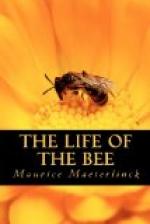They appear to be shivering in the darkness, to be numbed, suffocated, so closely are they huddled together; one might fancy they were ailing captives, or queens dethroned, who have had their one moment of glory in the midst of their radiant garden, and are now compelled to return to the shameful squalor of their poor overcrowded home.
It is with them as with all that is deeply real; they must be studied, and one must learn how to study them. The inhabitant of another planet who should see men and women coming and going almost imperceptibly through our streets, crowding at certain times around certain buildings, or waiting for one knows not what, without apparent movement, in the depths of their dwellings, might conclude therefrom that they, too, were miserable and inert. It takes time to distinguish the manifold activity contained in this inertia.
And indeed every one of the little almost motionless groups in the hive is incessantly working, each at a different trade. Repose is unknown to any; and such, for instance, as seem the most torpid, as they hang in dead clusters against the glass, are intrusted with the most mysterious and fatiguing task of all: it is they who secrete and form the wax. But the details of this universal activity will be given in their place. For the moment we need only call attention to the essential trait in the nature of the bee which accounts for the extraordinary agglomeration of the various workers. The bee is above all, and even to a greater extent than the ant, a creature of the crowd. She can live only in the midst of a multitude. When she leaves the hive, which is so densely packed that she has to force her way with blows of her head through the living walls that enclose her, she departs from her proper element. She will dive for an instant into flower-filled space, as the swimmer will dive into the sea that is filled with pearls, but under pain of death it behoves her at regular intervals to return and breathe the crowd as the swimmer must return and breathe the air. Isolate her, and however abundant the food or favourable the temperature, she will expire in a few days not of hunger or cold, but of loneliness. From the crowd, from the city, she derives an invisible aliment that is as necessary to her as honey. This craving will help to explain the spirit of the laws of the hive. For in them the individual is noting, her existence conditional only, and herself, for one indifferent moment, a winged organ of the race. Her whole life is an entire sacrifice to the manifold, everlasting being whereof she forms part. It is strange to note that it was not always so. We find even to-day, among the melliferous hymenoptera, all the stages of progressive civilisation of our own domestic bee. At the bottom of the scale we find her working alone, in wretchedness, often not seeing her offspring (the Prosopis, the Colletes, etc.); sometimes living in the midst of the limited family that she produces annually (as in the case of the humble-bee). Then she forms temporary associations (the Panurgi, the Dasypodoe, the Hacliti, etc.) and at last we arrive, through successive stages, at the almost perfect but pitiless society of our hives, where the individual is entirely merged in the republic, and the republic in its turn invariably sacrificed to the abstract and immortal city of the future.




